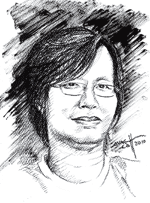
| By KYAW ZWA MOE | Tuesday, November 9, 2010 |
Burma's election is over. What's new and different after Sunday? Will Burma get a new system that reduces the rule of the military dictatorship?
Here the new Burma:
All incumbent 27 ministers and deputy ministers of the military government reportedly won in the Sunday elections.
 |
| Kyaw Zwa Moe is managing editor of the Irrawaddy magazine. He can be reached at [email protected]. |
Now, look at the leaders on the State Peace and Development Council: Former generals, No. 3 Thura Shwe Mann and Secretary-1 Tin Aung Myint Oo, won in their constituencies in Naypyidaw.
The USDP has reportedly won 82 percent of the seats in parliament. No surprise there. We've said repeatedly that Than Shwe and his team would rig votes. Most pro-democracy and ethnic parties that contested in the election knew the USDP would rig votes, but it was even worse than they expected.
The USDP made a mockery of the advanced vote process. Witnesses and party leaders said advanced votes would come in whenever a USDP candidate seemed in danger of losing. In Rangoon, they called the advanced votes “joker votes.”
Leaders of the National Democratic Force, a breakaway party of detained pro-democracy icon Aung San Suu Kyi's National League for Democracy, said that in some constituencies advance ballots represented about half of the eligible votes. As the biggest opposition party, the NDF contested 164 seats, a handful of the 1,157 seats in parliaments. It won 16 seats, the party said on Tuesday.
NDF party leader Khin Maung Swe said that polling station officials in many townships, such as Thanlyin and Kyauktan in Rangoon, suspended the counting of ballots on Sunday night at a point when the count showed the NDF leading. “Joker Votes” were rampant nationwide. In ethnic Mon State, Dr. Min Nwe Soe of the All Mon Region Democracy Party, said, “A suspeciously high percentage of advanced votes were cast in Mudon Township,” in which he contested.
Than Than Nu, the daughter of Burma's first premier, U Nu, told The Irrawaddy on Monday, “This election was the dirtiest among the elections after Burma gained independence from the British in 1948.” She's one of the “Three Princesses” comprised of Nay Ye Ba Swe and Cho Cho Kyaw Nyein, daughters of former prime ministers of Burma before 1962, when Ne Win's military government staged a coup.
“My father would say so if he were still alive,” said Than Than Nu, who lost as a parliamentary candidate in Mandalay Division representing the Democratic Party (Myanmar). Almost all candidates of the party, including the other two “princesses” and party leader Thu Wai, also lost. The party won a couple of seats out of the 48 constituencies it contested.
What else did we get out of this rare election, the first in the 20 years? The border towns of Myawaddy and Three Pagodas Pass, bordering Thailand, are battle grounds, with refugees fleeing the fighting. On election day, an ethnic army splinter group, the Democratic Karen Buddhist Army, engaged government's troops and seized some government buildings, including police stations, in the two towns. The fighting sent more than 10,000 refugees to Thailand's Mae Sot. It bodes ill, and is a sign of the instability to come in ethnic areas along the border.
“Is something better than nothing?” Or, is “the election an opportunity to move towards democracy?” Those were the optimistic statements of some people inside and outside Burma before the election. Actually, the election may have made things worse. By now, the world has learned a lesson, taught by the ruling generals, that many Burmese have learned repeatedly while living under the generals' boots for five decades.
Finally, how about the junta's reclusive dictator, Sen-Gen Than Shwe? As commander in chief, he didn't contest in the election. Will he relinquish power? Don't forget his main motivation was to gain legitimacy while continuing to rule the country. Thus, he may be elected president by the new parliament. But don't be surprised if he chooses to remain behind the scenes as the unofficial “Senior President” or “President Mentor,” the real power behind the scenes.
So, here's a snapshot of the new Burma: the new government will be composed of the regime's incumbent ministers; about 80 percent of the USDP candidates will have seats in the brand new parliament; Than Shwe will be elected president or assume the “President Mentor” role; ethnic groups who signed cease-fire agreements are likely to fight the regime, in response to increased pressure on them to become a border guard force.
Oh, yes. Don't expect to see the release of the more than 2,200 political prisoners under this new government.